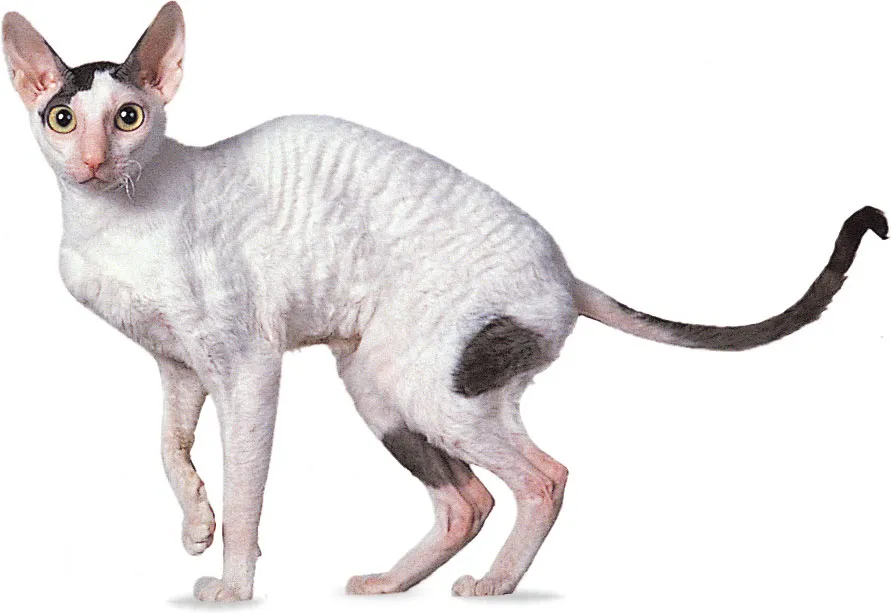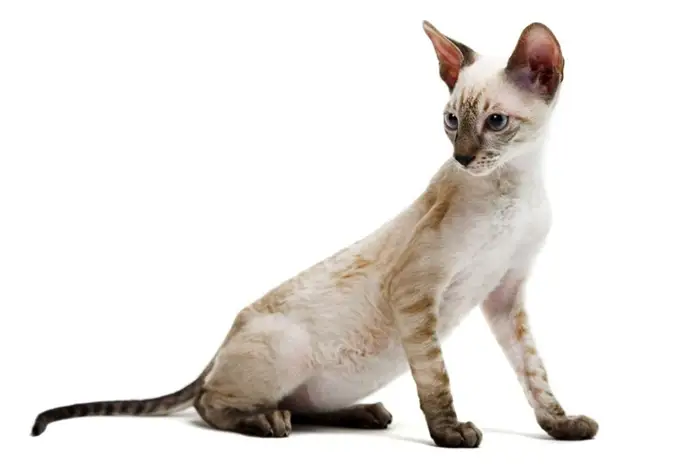Exploring the Fascinating World of Rex Cats
Types, Traits, and More
What You Need to Know Before Bringing Home a Rex Cat
Yes, cats can have curly hair! These special felines, known as "Rex" cats, have genetic mutations that give them their distinctive curly or wavy fur.
Their unique look makes Rex cats highly sought after, but before you adopt one, it's important to understand their specific needs and care requirements. Here's what you should know:
Curly Coat: Their curly fur requires regular grooming to prevent matting and to keep their coat healthy.
Health Needs: Like all pets, Rex cats have particular health needs that should be regularly monitored by a vet.
Personality: Rex cats are known for their playful and affectionate nature, but each cat is unique.
By learning about these aspects, you can ensure that both you and your new curly-haired friend are happy and well-cared for.

The Personality of Rex Cats
Rex cats are known for their chatty nature and impressive intelligence.
"Rex cats are super intelligent," says Yody Blass, MA, a certified animal behaviorist at Companion Animal Behavior in Washington, DC. "They’re also definitely more on the active side. If you’re getting a kitten, be prepared—they’re going to get into everything, and they’ll want to get up high. You’re going to want tall cat trees to keep them happy," adds Blass.
Their playful and smart nature means Rex cats can learn tricks and even compete in agility events. "Tunnels and other agility-focused toys can keep these cats engaged," Blass notes.
To keep your Rex cat entertained and out of trouble, investing in a variety of cat toys is a great idea.
How to Care for Your Rex Cat's Fur
Rex cats have unique curly fur that needs special care. Dr. Carol Margolis from the University of Pennsylvania School of Veterinary Medicine explains how to keep your Rex cat's fur healthy and clean.
Understanding Their Fur
Rex cats have curly fur because of their special hair follicles. This can make their fur break easily, especially if you brush them too hard. Their skin can also get oily and waxy, which might cause yeast infections. This means they need extra care, like regular ear cleaning and checking their nails.
Bathing and Shampoo
Rex cats sometimes need baths to remove extra oils and dander. The good news is they usually don’t mind baths. Use a gentle cat shampoo to avoid irritating their skin.
Brushing and Grooming Tools
You don’t need to brush Rex cats as often as long-haired cats, but some brushing is still helpful. Avoid using rubber grooming gloves, which can be too harsh. Instead, use the soft fabric side of grooming gloves or a velvet palm.
For long-haired Rex cats, like Selkirk Rex, gentle combing is needed to prevent tangles.
Potential Health Issues for Rex Cats
Like many purebred cats, Rex cats can have some health issues you should be aware of. Dr. Margolis highlights a few common concerns:
Heart Problems: Rex cats can develop hypertrophic cardiomyopathy, which is a thickening of the heart muscle. This condition can’t be seen on a regular X-ray. To diagnose it, a vet would need to do a special heart scan called an echocardiogram or sonogram.
Blood Clotting Issues: Rex cats might have coagulopathy, meaning their blood doesn’t clot normally.
Muscle Weakness: Some Rex cats may experience muscle weakness.
Skin Problems: They can also have poor hair growth and urticaria pigmentosa, which is an itchy skin disease.
Dental Problems: Rex cats often have dental issues. Dr. Margolis explains that there's a connection between skin and teeth development. If there’s an issue with hair follicle development, it can affect the teeth too. This might mean the cat has fewer teeth, teeth with fewer roots, or a jawbone that isn’t as strong as it should be.
Knowing about these potential health issues can help you take better care of your Rex cat and ensure they stay healthy and happy. Regular vet check-ups are essential to catch any problems early.

Different Kinds of Rex Cats
There are three kinds of curly cats recognized by the Cat Fancier’s Association (CFA): Devon Rex, Cornish Rex, and Selkirk Rex. These special cats started appearing in the 1950s in Devonshire, England. At that time, some regular cats gave birth to kittens with curly fur.
Selkirk Rex cats have a unique story. They trace their origins back to a curly-coated kitten born to a house cat in Montana in 1987.
Devon Rex and Cornish Rex cats have short fur, big eyes, and large ears. They're known for their sleek and slender build. On the other hand, Selkirk Rex cats can have short or long curly fur. They're a bit bigger and sturdier compared to the other Rex cats, with a more robust appearance.
Cornish Rex
Cornish Rex cats are known for their delicate appearance, characterized by an oval head, large round eyes, and prominent ears perched high on their heads. Their short, wavy coats give them a unique texture, often likened to petting a rabbit's fur.
One notable trait of Cornish Rex cats is their relatively hypoallergenic nature, making them a potential choice for allergy sufferers, although they still shed their fur to some extent.
In terms of personality, Cornish Rex cats are incredibly friendly and playful, maintaining a lively and kitten-like energy throughout their lives. They thrive on human companionship and enjoy being in the company of their human family members.
Originating in Cornwall, England, in 1950, the breed's lineage can be traced back to a peculiar curly-haired cat named Kallibunker. Through selective breeding with various other cat breeds like Burmese, Siamese, and British domestic shorthairs, the Cornish Rex breed was established, revealing the recessive nature of the curly-haired gene.
While Cornish Rex cats are generally healthy, they may have a genetic predisposition to conditions such as polycystic kidney disease and progressive retinal atrophy. Their coat colors and patterns can vary widely, including calico and tortoiseshell patterns, adding to their charm and appeal.
Selkirk Rex
Selkirk Rex cats are known for their big, round faces and sturdy bodies. They come in both long-haired and short-haired varieties, with a distinctive curly coat that's coarse to the touch. If you have a Selkirk Rex, you won't need to brush them as much as other cats, but the occasional bath with a gentle shampoo is recommended to keep their coat clean.
Unfortunately, Selkirk Rex cats may be prone to polycystic kidney disease, so it's essential to keep an eye on their health.
Interestingly, the Selkirk Rex breed started with a cat found in a Montana shelter. This cat was bred with a black Persian cat, leading to the creation of the breed. What's unique about Selkirk Rex genetics is that the curly hair mutation is dominant, meaning curly-haired kittens can be born in the same litter as straight-haired ones.
Selkirk Rex cats come in various colors and patterns, from pointed to smoke, adding to their charm and diversity.
Conclusion
In conclusion, Rex cats are a fascinating and diverse group known for their unique curly coats and friendly personalities. Whether you're considering a Devon Rex, Cornish Rex, or Selkirk Rex, each breed brings its own charm and characteristics to the table. From their playful nature to their hypoallergenic qualities, Rex cats make wonderful companions for cat lovers of all kinds. However, it's essential to be aware of potential health issues associated with each breed and to do thorough research before bringing one into your home. With proper care and attention, Rex cats can bring joy and companionship to your life for many years to come.
FAQ's
Q: What causes the curly coat in Rex cats?
The curly coat in Rex cats is caused by a genetic mutation that affects the structure of the hair shafts. This mutation disrupts the normal development of guard hairs (the longer, outermost hairs) and awn hairs (the intermediate hairs), resulting in a coat that is predominantly composed of down hairs (the shorter, softer hairs). The down hairs are curly or wavy in texture, giving Rex cats their characteristic curly coat.
Q: What are the personality traits of Rex cats?
Rex cats are known for their friendly, affectionate, and playful personalities. They are often described as outgoing, sociable, and intelligent, with a strong desire for human companionship. Rex cats enjoy interacting with their owners and are typically curious, energetic, and adventurous. They may also have a mischievous streak and enjoy exploring their surroundings and engaging in interactive play.
Q: How do I care for a Rex cat's coat?
Caring for a Rex cat's coat involves regular grooming to keep the coat clean, healthy, and free of tangles or mats. Despite their short coats, Rex cats may still shed and require grooming attention. Here are some tips for caring for a Rex cat's coat:
Brushing: Use a soft brush or grooming mitt to gently brush the cat's coat regularly to remove loose hair and prevent matting.
Bathing: Occasionally bathe the cat with a mild, hypoallergenic shampoo to keep the coat clean and remove excess oils.
Moisturizing: Apply a moisturizing lotion or oil to the cat's skin and coat as needed to prevent dryness and maintain hydration.
Protection: Protect the cat's coat from environmental factors such as sun exposure, extreme temperatures, and harsh chemicals that may cause damage or irritation.
Veterinary care: Schedule regular veterinary check-ups to monitor the cat's overall health and address any skin or coat issues promptly.